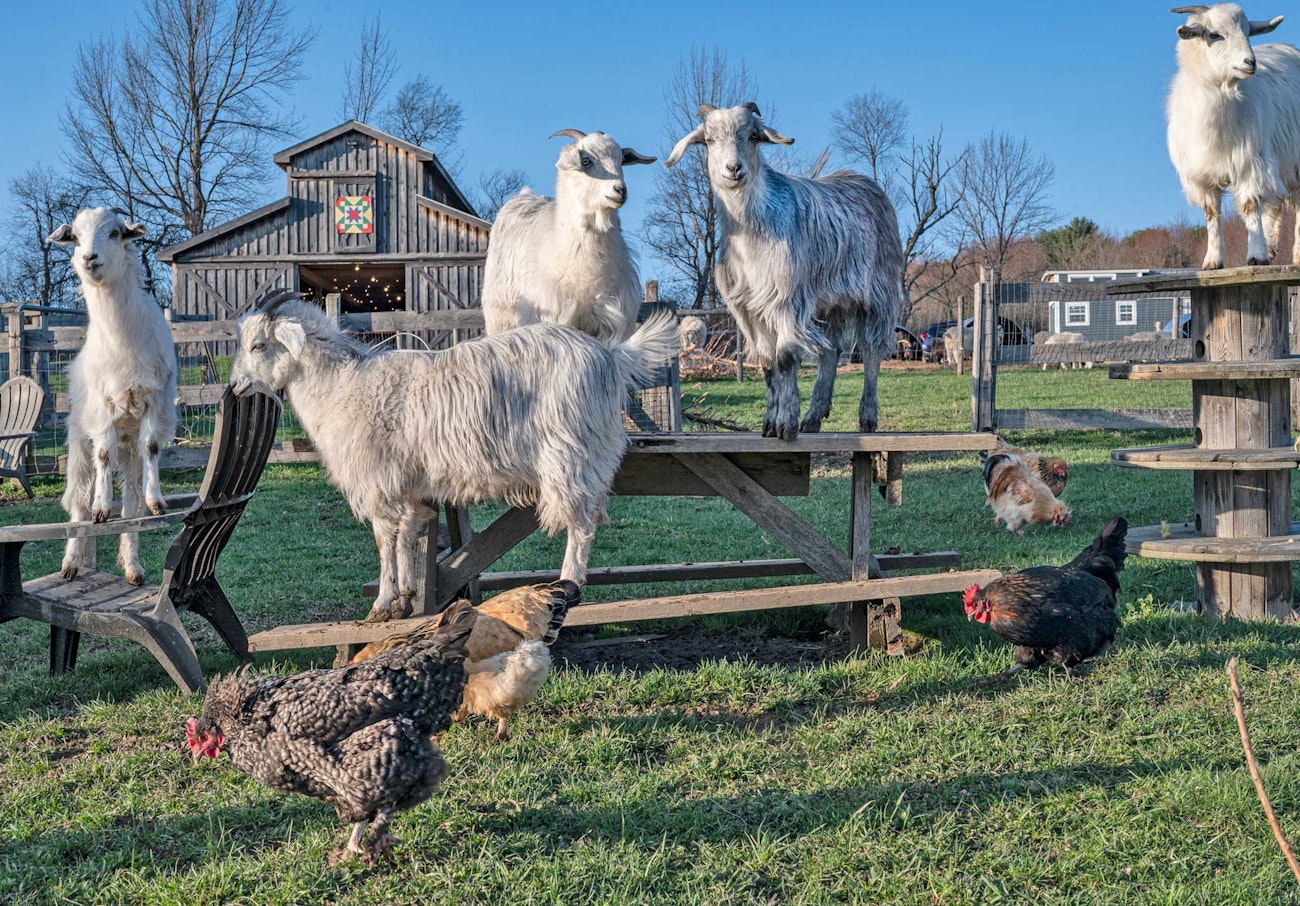Subscriber Exclusive
Clean Cashmere Has Big Plans for Small Farms
The quintessential luxury fiber, American-grown cashmere is difficult to find as fiber, yarn, or clothing. An accidental cashmere farmer is building a network to change that.
The quintessential luxury fiber, American-grown cashmere is difficult to find as fiber, yarn, or clothing. An accidental cashmere farmer is building a network to change that.
<a href="https://farmfiberknits.com/clean-cashmere/">Continue reading.</a>
https://farmfiberknits.com/cdn-cgi/image/format=auto/https://www.datocms-assets.com/101500/1725909788-zucker-cashmere-header.jpg?auto=format&w=900
At home at Hulse Hill Farm, Christine Hulse’s daily goat chores include morning rounds of letting the 24 goats out of barns, feeding, and checking the herd. Photos by Gale Zucker
Christine Hulse didn’t plan to change the United States cashmere farming landscape when she brought goats to her family’s agritourism business in 2004 at Hulse Hill Farm. Nor did she foresee a new career as partner in a nationwide organization of cashmere farms to support standards and sustainability and provide a market for their fiber.
A former school counselor, Christine grew up as a 4H kid. When she decided to add small animals to her picturesque 14-acre hillside farm a few minutes from Main Street in Cooperstown, New York, she chose cashmere goats. She thought they’d pique the interest of her farm-stay guests.
 Cashmere goats at Hulse Hill Farm in Fly Creek, New York.
Cashmere goats at Hulse Hill Farm in Fly Creek, New York.
It didn’t take long for Christine to learn that the US cashmere market was in disarray. Although interest in the luxury fiber was abundant, small family farms raising cashmere faced challenges in bringing their high-quality
SUBSCRIBER EXCLUSIVE
Unlock the Full Article with a Farm & Fiber Knits Subscription
Get instant access to this article and the entire Farm & Fiber Knits library of projects, inspiration, and expert instruction. With your subscription, you’ll receive:
Connect more deeply with your yarn—learn the stories of farmers, shepherds, and dyers
Knit patterns that celebrate natural fibers and slow, intentional making
Support a community of small farms, women makers, and independent yarn companies
Includes print and digital issues of Farm & Fiber Knits, delivered directly to you
With must-knit projects and unforgettable stories, Farm & Fiber Knits invites you to see the craft world through fresh eyes.
Plans start at just $5.83/month (paid annually). Cancel anytime.
Christine Hulse didn’t plan to change the United States cashmere farming landscape when she brought goats to her family’s agritourism business in 2004 at Hulse Hill Farm. Nor did she foresee a new career as partner in a nationwide organization of cashmere farms to support standards and sustainability and provide a market for their fiber.
A former school counselor, Christine grew up as a 4H kid. When she decided to add small animals to her picturesque 14-acre hillside farm a few minutes from Main Street in Cooperstown, New York, she chose cashmere goats. She thought they’d pique the interest of her farm-stay guests.
 Cashmere goats at Hulse Hill Farm in Fly Creek, New York.
Cashmere goats at Hulse Hill Farm in Fly Creek, New York.
It didn’t take long for Christine to learn that the US cashmere market was in disarray. Although interest in the luxury fiber was abundant, small family farms raising cashmere faced challenges in bringing their high-quality[PAYWALL] fiber to market.
Get a closer look! Click any image to open it in full-screen mode and read more about Hulse Hill Farm and their goats.
Cashmere goats are not purebred and include a wide range of goats—they do not all look the same! Other than angora goats, any goats that meet the standards (with coarse guard hairs and soft, fluffy undercoats of at least 1¼" long, crimped, and with an average diameter of less than 19 microns) qualify as cashmere goats.
By 2017, Christine found herself in a leadership role of the Cashmere Goat Association and organizing an international cashmere summit in Tuscany, Italy. There she met Heidi Dickens, a cashmere goat farmer in Oklahoma, who shared her vision for a well-resourced, viable cashmere market in the United States. They formed a partnership to support cashmere farmers in raising herds sustainably, ethically, and profitably—by buying all of the fiber from member farms. It took two years of planning, plus a pause for the pandemic, and then Clean Cashmere launched in 2021. At present, a dozen farm members of Clean Cashmere receive educational and functional support from Christine and Heidi, including in-person visits.
Click any image to open it in full-screen mode and learn more about one of the farm visits.
Clean Cashmere produces four yarns, which are available online, at select festival events, and at pop-ups in retail stores and local yarn shops. In addition to 100% cashmere, they offer yarns that blend cashmere with tussah silk, Merino, and Cormo. Blending with Cormo allows Clean Cashmere to use fiber from older goats.
Click on any image below to open it in full-screen mode and learn more Clean Cashmere’s yarn.
In 2023, Clean Cashmere purchased 250 pounds of raw fiber from member farms, yielding about 150 pounds of cashmere fiber to bring to market. The company’s next goal is to purchase 500 pounds a year, and then eventually 1,000 raw pounds over slow growth.
All that raw fiber will close the loop between small American cashmere farms and many appreciative maker hands.
Gale Zucker is a commercial and editorial photographer with a specialty in wool and handmade items. As a lifelong knitter, she is thrilled to combine that passion with her profession. When not working, she can be found swimming or knitting in her Connecticut beach neighborhood.
 Cashmere goats at Hulse Hill Farm in Fly Creek, New York.
Cashmere goats at Hulse Hill Farm in Fly Creek, New York. 












